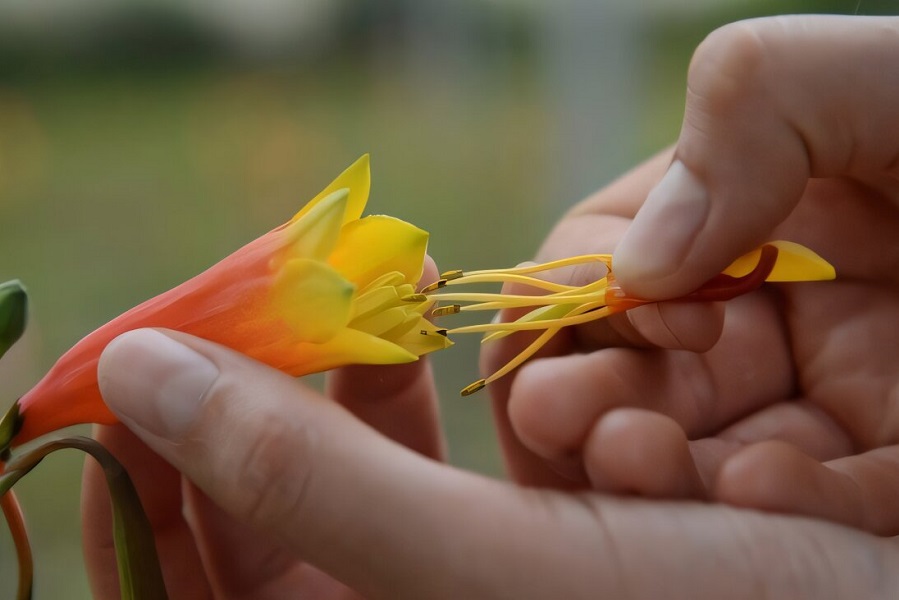11 Dec 2024

Tired Earth
By The Editorial Board

Wilting flowers might not signal poor flower or plant health, but rather the effects of a sophisticated resource management strategy in plants, millions of years in the making.
A study in the journal Plant Biology by researchers from Macquarie University and international collaborators has shown for the first time that plants reuse resources from wilting flowers to support future reproduction.
Lead author Honorary Professor Graham Pyke from Macquarie University says the findings help explain a common but poorly understood plant process.
"Our research delivers the first direct demonstration that plants can salvage resources from wilting flowers and reuse these resources to promote future reproduction," Professor Pyke says.
These resources include the energy and chemical makeup of the petals—including carbohydrates and nutrients like nitrogen and phosphorus.
Running the trials
The three-year study focused on Blandfordia grandiflora, commonly known as Christmas Bells, which mostly flowers in December.
This perennial plant species with colorful red and yellow flowers, native to eastern Australia, is often sold in flower markets in Australia and internationally.
Commercially-grown stems of Christmas Bells produce anything from two or three flowers to a dozen or more.
"Our research takes place on a plantation containing several hectares of native wet heath where Christmas bells flower quite profusely, along with a commercial shadehouse," says Professor Pyke.
The team used a variety of techniques to control pollination and flower wilting and then checked the effect on seed production and reflowering.
To their surprise, the researchers found that plants did not use the resources from wilted flowers to improve short-term reproduction by either the same flowers or other flowers on the same plant.
"These plants salvage resources invested in reproduction during one flowering season and reuse these resources during the next flowering," Professor Pyke says.
To do this, Blandfordia grandiflora transfers resources from its wilting flowers, storing this "chemical energy" underground in corms and roots to then help produce new flowering stems in the subsequent season, generally a year later.

Plant economics
Professor Pyke says the plant world is a fascinating realm of resource management and economic strategy.
"Plant economics are all about trade-offs," he says. "Plants must make decisions about where to allocate their limited resources; investing in one area means they can't invest as much in another."
This concept of resource allocation is what led Professor Pyke to investigate the phenomenon of flower wilting, which for years scientists have speculated might be a way for plants to shift valuable resources to other processes.
"We were in for a surprise," says Professor Pyke. "It turns out the plants were playing a longer game than we anticipated, not using their reclaimed resources immediately, but saving them for the next flowering season."
Professor Pyke says plants have evolved diverse strategies for managing their flowers after they've served their primary reproductive function, with wilting just one of several possible approaches.
Not all plants follow the flower wilt pattern; flowers will still bloom on some plants long after they can be fertilized and after they stop producing nectar.
"Flowers make the whole plant more attractive to pollinators even when they are just there as part of the overall display," he says.
Some plants will even drop their blooms well before they wilt. "For example, jacaranda flowers that seem perfectly good will just drop to the ground; frangipani trees will also shed intact flowers rather than have them wilt."
Testing theories
The study tested resource reuse in different ways.
One experiment compared seed production between plants with flowers allowed to wilt and those with petals removed to prevent wilting. Another prevented seed production in all flowers—but allowed wilting in one group of plants.
"We can easily prevent seed production by snipping off the stigma," says Professor Pyke.
Results showed plants with wilting flowers were more likely to reflower the next season than those where wilting was prevented.
The study also considered other factors that might influence seed production, such as flowering stem height, number of flowers per stem, and flower position.
Taller flowering stems, for example, produced more seeds and heavier seeds, as did stems with more flowers. But flowers positioned lower down on the plant tended to have fewer seeds, and seeds that weighed less.
"Our findings pave the way for further research into other plant species, and how they recover and reuse the resources from wilting flowers," Professor Pyke says.
Further research could explore what these salvaged resources are made of, how plants move and change them, and whether the benefits of saving these resources outweigh the costs of making flowers in the first place.
Source : phys.org
Comment